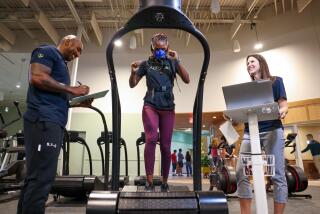Going the distance
- Share via
Ah, the luxury of a personal trainer. Someone to watch every lat pull-down and be there for each arduous treadmill trek. But personal trainers are a luxury for most people, and as life whittles down our spare time and expands our waistlines, many people are turning to a more convenient way to get coaching help: the telephone and Internet.
It’s a natural progression from the face-to-face personal training that’s been around for years and is still growing in popularity. While there are cons and caveats to fitness coaching via the phone or Internet -- coaches can’t see if you’re doing an exercise correctly, for instance -- it appeals to a wide variety of the population, several coaches say, from out-of-shape folks needing start-up help to veteran exercisers who want to tweak their routines.
There’s even some published research that suggests phone and Internet coaching can provide results similar to face-to-face encounters.
Although coaches and programs differ, here’s the basic rundown: A client signs up with a coach, who does a background interview that includes a medical history, exercise experience, lifestyle evaluation and goal-setting. The coach sets up a regimen for the client, then follows up via weekly phone calls or e-mails to track progress, offer motivation and help overcome exercise obstacles. Some programs employ heart-rate monitors, pedometers or software to track exercise and diet progress. Others may include guidance on nutrition and other health-related issues.
Most of these coaches ask you to pay upfront, committing to a program from one to six months. Prices vary, according to services, from $10 to $400 a month. Some programs are bare-bones, offering little more than weekly e-mail correspondence and access to online information, while others provide in-depth phone counseling, monthly newsletters plus frequent check-ins and fitness evaluations.
Some coaches work independently, while others are employed by larger companies. Many corporations offer coaching to their employees, rather than subsidizing health club memberships.
Convenience remains the top reason most people sign up; many who have had trainers in the past simply don’t have time for one now, but they can fit distance counseling into busy schedules. Michael Braverman, a 47-year-old Santa Monica businessman, signed up with FitAdvisor.com when he found himself traveling a lot. “It was helpful,” he says, “when I’d be in the middle of Asia and it’s hard to maintain the kind of exercise I was doing in L.A.”
He also called on his coach to help tailor his fitness routine as he got older. “I wanted to be able to figure out what would be the best things to do for my body, without getting injured,” he says. “It’s about having somebody with whom you can constantly communicate, who can motivate you and keep you informed.”
Janell Mithani likes the fact that her Fitness by Phone coach understands that, as a working mother, her time is limited. She hadn’t worked out for a year when she hired a Fitness by Phone coach two months ago.
She’s happy with the results, crediting the coach with helping her stick to a manageable exercise program. “I can’t do the whole gym routine,” says Mithani, a photographer living in Altadena, “so she helped set up a program that includes walking and strength training, getting on my bike or just walking around the house.”
So far Mithani has lost 11 pounds and has more energy. And she doesn’t have an urge to fudge her results. “If you’re not going to be honest with them, then you’re not going to be honest with yourself,” she says.
This form of fitness counseling might appear to be susceptible to a little deceit -- after all, the coach might never see you in person -- but coaches and clients say it isn’t a big problem.
“I think a lot of it has to do with responsibility,” says Susan Block, founder and president of the Assn. of Fitness by Phone Coaches, which licenses a counseling program to some 100 coaches in the United States and Canada. When Block was a personal trainer, she often felt like a baby sitter who did everything except the exercise itself. Many clients wouldn’t work out on their own and cancellations were common.
Tracking their progress themselves, however, helps people “feel more empowered,” says Block. “They can see that this activity burns this many calories.”
Walter Thompson, professor of kinesiology and health at Georgia State University and an American College of Sports Medicine spokesman, says the honesty quotient comes down to dollars and cents. “When you’re talking to a coach, the meter’s on,” he says. “You’re paying for it, and that’s a big difference.”
While he believes that distance coaching has great potential, he advises people to be aware of some pitfalls. For example, anyone can call themselves a fitness coach on the Internet. Most companies claim to have a rigorous screening and training process, and only hire coaches who have some fitness-related education, have done in-person private training and have reputable certifications from organizations such as ACSM, the American Council on Exercise, or IDEA.
But before handing over a penny, consumers should thoroughly check out companies and coaches. Some companies are allied with dietary supplement manufacturers, and others might not hire qualified coaches. When interviewing a coach, people should ask about education, work history and certification. It’s also a good idea to ask for references. Issues such as pregnancy, injuries or a chronic medical condition require coaches qualified to deal with those concerns.
Heather Moreno, a Fitness by Phone coach in Huntington Beach who’s been in the business since 1998, says she keeps track of many of her former clients and that about three of every four have maintained their routines. “I think when people leave they’re in the mind-set of keeping fit,” she says. “They know what to do and how to track their progress.”
The next generation of distance coaching will incorporate Web cam technology when it becomes more affordable. Then, coaches will be able to demonstrate techniques, check to see if their clients are doing moves correctly and be able to tell if 10 pounds actually did come off.
“I’m really excited about the possibilities for the future,” says Thompson. “There are guys I know who say they can’t go to the gym because parking is a problem. But if you can log onto your computer and talk to someone and get good, solid advice, I think the compliance is going to be increased.”
*
(BEGIN TEXT OF INFOBOX)
Dial a fitness coach, or find these online
Fitness by Phone (www.FitnessbyPhone.com): Coaches counsel clients, mainly by phone, and track fitness progress with monitors. Some follow up with clients. Cost: about $400 a month.
*
Nutricise (www.Nutricise.com): Clients interact with coaches via e-mail. The company also offers nutrition advice, Internet group support and online weight-watching and fitness tools. Cost: $49.95 for the first month; $19.95 each additional month.
*
FitAdvisor (www.FitAdvisor.com): Plan options include phone consultations, e-mail advice and tips, online fitness and nutrition resources. Cost: $125 to $420 a year.
*
Wellcoaches (www.Wellcoaches.com): Phone counseling on fitness, diet and lifestyle issues. Cost varies according to different plans, but starts at $50 to $85 for an initial one-hour consultation, and $25 to $42.50 for subsequent 30- to 40-minute sessions.
*
MyFitnessExpert (www.MyFitnessExpert.com): Coaches form plans and communicate via e-mail. Progress is monitored online. Cost: $39 a month.
*
Times staff writer Jeannine Stein can be reached by e-mail at jeannine.stein@latimes.com.


